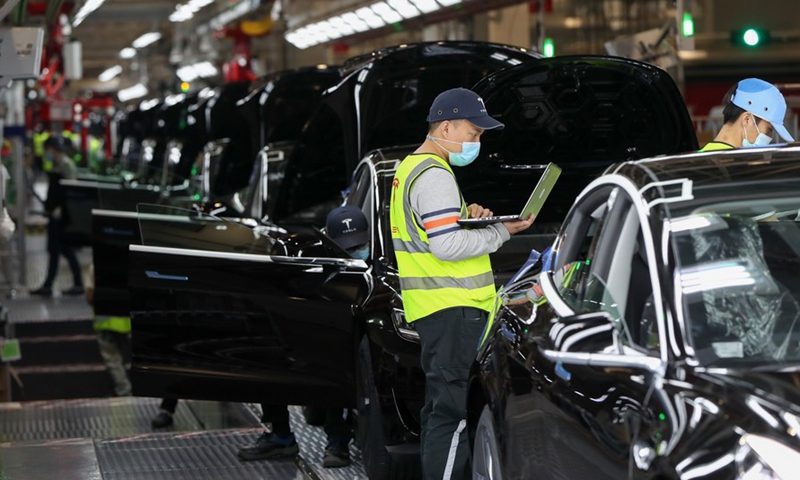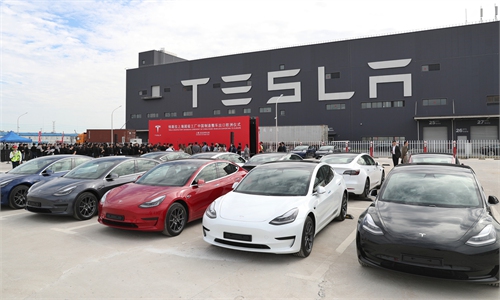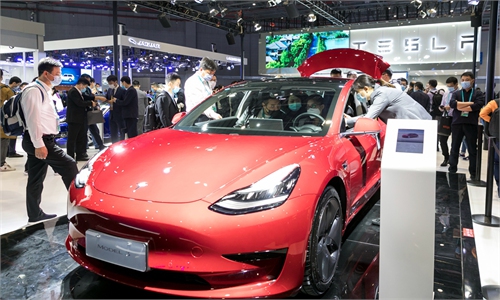
Employees work at the Tesla Gigafactory in Shanghai, east China, Nov. 20, 2020. Photo:Xinhua
US electric carmaker Tesla reported record quarterly profits and revenue for the third quarter on Wednesday US time, boosted by robust growth in production and demand in the Chinese market.
Despite consumer complaints about alleged brake failures, the company saw strong sales and productions in the Chinese market in recent months. As it shifts to new batteries, the company could be even more reliant on Chinese suppliers, analysts said.
Net income reached an all-time high of $1.62 billion during the quarter, more than quadrupled the $331 million in the same period quarter year. Revenue rose 57 percent year-on-year to $13.8 billion, also a record for the company, which is mainly achieved through growth in vehicle deliveries.
Tesla delivered 241,300 cars worldwide in the third quarter, a record for the company, and more than 96 percent of deliveries were the Model 3 and Y, boosted by production at its Shanghai factory.
"For all of Q3, China remained our main export hub. Production has ramped well in China, and we are driving improvements to increase the production rate further," the company said.
Tesla China produced 306,600 vehicles from January to September, a year-on-year increase of 251.1 percent. In the first half of 2021, Tesla China exported 50,000 cars, according to the China Passenger Car Association (CPCA).
Tesla can produce over 450,000 Model 3 and Y cars at its Shanghai factory per year, compared with 500,000 at its factory in Fremont, California.
The electric carmaker also announced a shift to lithium iron phosphate (LFP) battery chemistry globally for standard-range vehicles, a move that will boost Tesla's purchase of LFP components supplied by Chinese manufacturers, analysts said.
Most of the auto industry relies on nickel and cobalt in lithium-ion batteries, but higher prices of nickel are having an impact on battery cells, according to Tesla's Chief Financial Officer Zach Kirkhorn.
The shift would make Tesla rely more on Chinese suppliers, Feng Shiming, an auto industry analyst, told the Global Times on Thursday.
"From rare earths to precious metals, China has the most complete supply chain, which is more cost-effective and less affected by systemic risks due to the impact of COVID-19, compared with overseas rivals," Feng said.
China has also served as a growing consumer market for the US electric carmaker, so having more parts and components manufactured in the market can help the company get more feedback from consumers, improve its iteration ability, and launch new technologies and new formats at a faster pace, he added.
According to CPCA data, sales of Tesla hit a record high in the Chinese market in September despite high-profile consumer complaints about brake failures, which triggered quality concerns involving Tesla vehicles earlier this year.
In September, sales of Tesla China rose 27 percent from August to hit 56,006 units, up 394 percent from a year earlier, according to CPCA data.
Tesla made headlines at the Shanghai International Automobile Industry Exhibition in April, when a woman leaped onto a Tesla car on display, wearing a T-shirt bearing the words "Tesla's brake fails" and screamed in front of a bewildered crowd.
"For now, [the protest] doesn't seem to have had a substantive impact on sales volume," Feng said. He predicted that Tesla's sales in the Chinese market will likely reach 140,000 units in the fourth quarter.
Global Times


